
Arakin_1_kurs
.pdf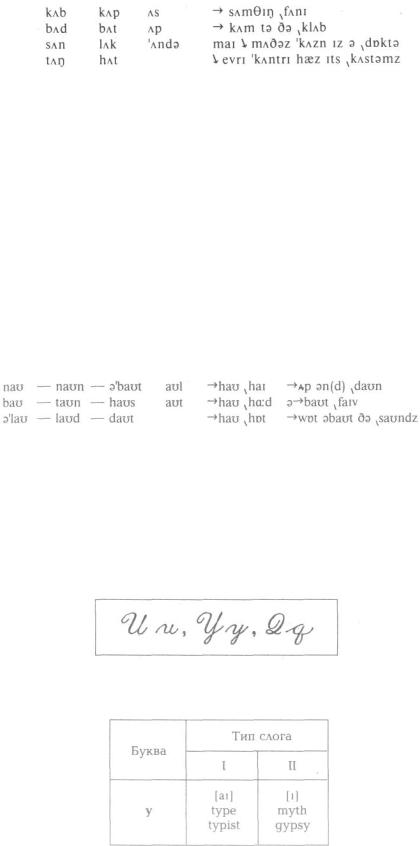
Phonetic Exercise 27
. , :
1.[ ].
2.[h z], .
3.[k], [t].
4..
5..
5. [ ] - . |
|
||||
|
|
|
|
|
, |
. , [a ],
[ ].
. [ ] ,
.
Phonetic Exercise 28
. , :
1.[ ].
2.[ ].
3.[h], .
4.[d] [ n(d)].
Uu [ju:], Yy [wa ], Qq [kju:] :
y I II
[ ]: Betty;
[y]: yes.
u I II
31
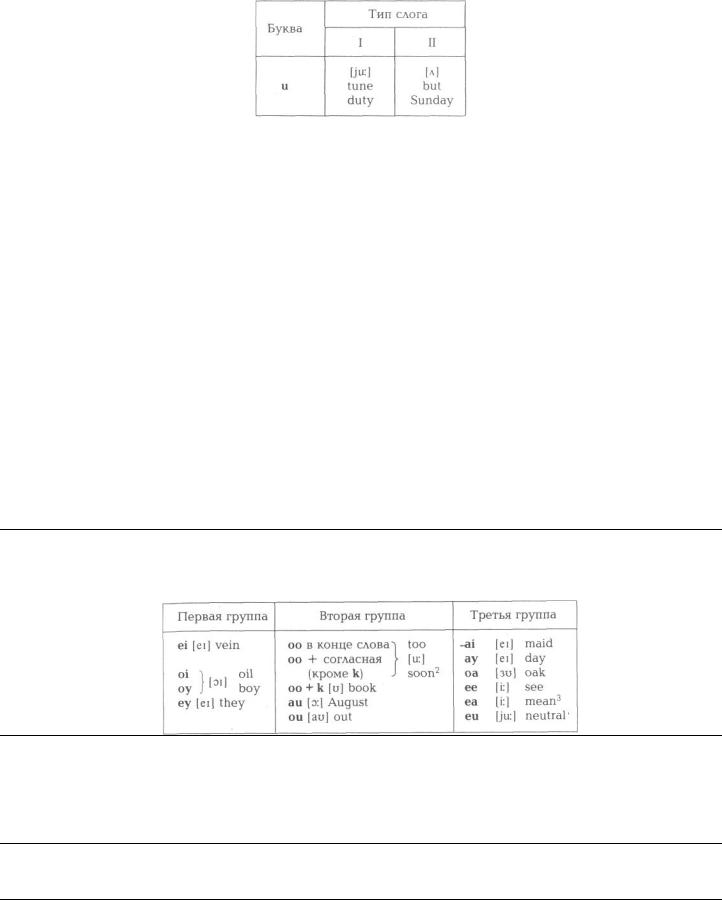
[r], [l], [ ] u [u:]: rule, flute, June.
ng [ ]: long [1 |, sang [s ].
, .
.
:
- , .
. : ei - vein [ve n], oi - oil [o l].
- , .
. : u -August [' g st], u - loud [la d].
.
. : ai - maid [me d] - ; eu - neutral ['nju:tr l] - .
i + , + , u + III
ie, oe, ue .
: ,
, I, ,
. : diet ['da t],* trial ['tra l], duel ['dju: l].
* ie [i:]: field, believe.
ai, ei, oi, , , , , , ea, ay, ey, oy, eu
*good, wood, stood, foot + [ ].
**d th [ ]. : dead, bread, death. : read [ri:d], lead [li:d].
, i, , ( ) [ ]: delegate ['dehgit]*.
* -ate [ t] , [e t]: to delegate [t 'del ge t].
, u, ( ) [ ]*: pilot ['pa l t], circus ['s :k s], cinema ['s n m ].
* u . : institute [' nst tju:t].
, [ ]: potato [p 'te ].
n 1, : final ['fa nl], garden ['g dn], lesson ['lesn].
[ ] [ ]. : hockey
32
['h k ], famous ['fe m s].
ow [ ]: window ['wind ].
TEXT
A VISIT
W: Hello, Betty!
B: Good afternoon, Mr. White!
W: Is Doctor Sandford ['s nf d] in?
B: No, he isn't. Doctor Sandford is still in the hospital. W: Is Mrs. Sandford at home?
B: No, she isn't. Mrs. Sandford is out. She is in the park with Benny, and old Mrs. Sandford is not well.
W: Oh, that's a pity! What's the matter? It isn't the flu, is it? B: Oh, no, it's a bad cold, she's better today.
W: Is she in bed?
B: No, she isn't. Come in, Mr. White, and have a talk with Mrs. Sandford. She is always glad to see you. W: Perhaps, some other day, Betty!
B: I'm so sorry Mr. Sandford isn't at home yet.
W: That's all right. Remember me to Mrs. Sandford.
B: Yes, Mr. White.
W: So long then, Betty!
B: So long, Mr. White. On Saturday Mr. Sandford is at home after four.
Vocabulary notes
to be in , . g. Is Dr. Sandford in? ? Ant. to be out , . g. Mrs. Sandford is out. .
not to be well = to be unwell; to feel bad . . g. Mrs. Sandford is not well. I feel bad today.
That's a pity! ! What a pity!
What's the matter? ? ? What is it? flu n
It's a bad cold. ( ).
She is in bed. . in bed, by bus, to school
.
to have a talk ; : to have a smoke : to have a swim (
)
to be glad , . g. She is glad to see you. perhaps ,
some other day
to be sorry , . g. I'm sorry, he is out.
Remember me to Mrs. Sandford. .
Conversational phrases
Approval: Well, yes. Right! Good, isn't it? Yes, I see. Quite! Nice, isn't it? Yes, very likely. That's right. Wonderful! Splendid! Fine! First-rate! Excellent! Magnificent! Fantastic! That's a good idea!
Disapproval: Pity! That's a pity! What a pity! What a shame! Awful! (What) nonsense! No wonder! How very strange!
Phonetic notes
1. ( , , , ) ( ,
, , ) : :
33
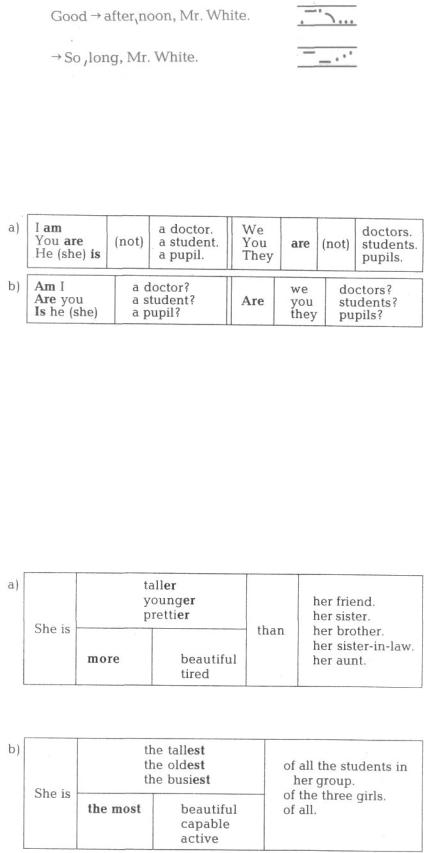
has [h z - h z - z]
, . :
[ z \ lw z ,gl d t ,si: ju ]
2. , ,
:
Study the following
Table No. 1
The verb to be in the present indefinite tense
Contracted forms
Are you a student? - Yes, I am. No, I'm not.
Is he a pupil? - Yes, he is. No, he isn't.
Are you doctors? - Yes, we are. No, we aren't.
Table No. 2
Degrees of comparison of adjectives
Comparative
Superlative
34
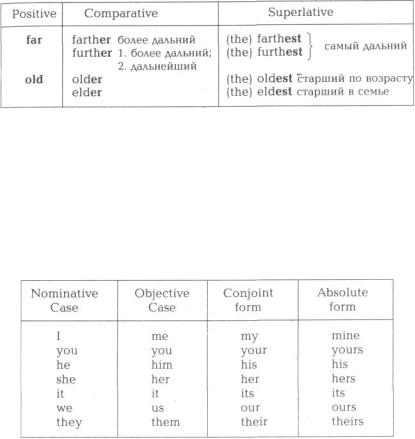
T a b l e N o . 3
Adjectives which have two forms of comparison
.
as ... as.
not so ... as not as ... as; e.g. My flat is as large as yours. My flat is not so large as yours. My flat is not as large as yours.
T a b l e N o . 4
Personal and possessive pronouns
Spelling rules
1. , ,
-er, -est
: big - bigger - biggest.
2. , -er, -est
i; busy -busier - busiest; dry - drier - driest; : gay - gayer - gayest.
3. , -er, -est : large - larger - largest.
4. , -s, -ss, -x, -sh, -ch,
-es [ z]: bus - buses; glass - glasses; box - boxes; dish - dishes; match - matches.
5. -es , ; potato - potatoes.
piano photo -s: piano - pianos; photo - photos. 6. , , i
-es: study - studies; family - families.
, : day - days. 7. brother-in-law
: brothers-in-law.
8. , -f -fe, -s -es, f
v: leaf -leaves; wife - wives.
roof, chief, handkerchief
-s: roofs, chiefs, handkerchiefs.
9. child, ox -en: child - children; ox - oxen.
35
10.
: man - men; woman - women; mouse - mice; tooth - teeth; foot - feet; goose - geese.
11. : swine, sheep, deer, fish.
Exercises
I. Study Substitution Tables No. 1-4 and compose as many sentences as you can.
II. a) Read aloud:
speed, loaf, loom, reach, rose, fill, coal, aim, cube, weave, faint, steam, tool, freeze, mutton, crystal, tense, shoot, trainer, coast, raze, float, beach, least, boot, fee, rein, author, veil;
a merry song, a big boat, a simple riddle, a little star, a black bag, an old goat, a good cook, a fat cock, a good accent, an old oak, a good tool.
b) Concentrate on the rhythm, sentence stress, weak forms of the pronouns and the low falling tone:
His mother is \ill. Her cousin is \right. My sister is \in. His brother is \out. The man is \wrong. His wife is \out. The man is \bad. The woman is \good. The girl is \clever. His daughter is \pretty.
III. a) Write five words with each of the following digraphs: oo, , ea, oa. b) Copy out in columns the words with the digraphs from your book on home reading.
IV. Write the plural form of the following nouns. Transcribe them:
college, writer, family, wife, child, mouse, parrot, house, bird, man, goose, woman, leaf, roof, day, son-in- law, turkey, swine, box, dish, sheep.
V. Before you start working at the text practise the sounds in the following words and word combinations:
1.[i] - is, in, visit, still, pity;
[e]- Betty, Benny, well, better, bed, yet, then;
[ ] - matter, bad, have, glad, Saturday, Sandford; [ ] - oh, no, so, old, home, cold;
[ ] - doctor, hospital, sorry, long.
2.a) Alveolars replaced by dentals: in the hospital; in the park.
b)No glottal stop: Is Doctor Sandford in? She is in the park. She is always glad; is not at home yet.
c)Loss of plosion: bad cold, glad to see you.
VI. a) Listen to the recording of the dialogue "A Visit". Mark the stresses and tunes. b) Practise the text for test reading. Listen to it very carefully until you can say it in exactly the same way. c) Memorize the dialogue and dramatize it.
VII. a) Read the following special questions. Concentrate on the intonation. Observe the weak forms of the pronouns and the verb to be:
1. When is she \busy? 2. Why are you \late? 3. When are you \free? 4. When are you \busy? 5. Why are you \sad? 6. Why is 'Betty in the \park? 7. Why is Mrs. 'Sandford in \bed? 8. Why is he 'still at the \hospital? 9. When is she at \home? 10. Why is she 'still at \home?
b) Change the special question into general ones and answer them as in the model. Work in pairs.
M o d e l : Why is he in bed?
36
Is he in bed?
Yes, he is.
VIII. Answer the following questions:
1. Is Doctor Sandford in? 2. Where is he? 3. Is Mrs. Sandford at home? 4. Is Mrs. Sandford in the park with Benny? 5. She isn't in the garden, is she? 6. Old Mrs. Sandford isn't ill, is she? 7. Is she in bed? 8. She is better today, isn't she? 9. Is Mr. Sandford at home after four on Saturday? 10. Is he at home after four or at half past four on Saturday?
IX. a) Complete the following general questions to make them alternative.
M o d e l : Is he /busy? - Is he /busy | or \free?
1. Are they in the garden ...? 2. Is your sister at the Institute ...? 3. Is Doctor Sandford at the hospital...? 4. Is his wife in the park ...? 5. Is the exercise easy ...? 6. Is Betty nineteen ...? 7. Is the hall big...? 8. Are you free on Saturday ...? 9. Are these lessons difficult...? 10. Is this sentence long ...?
b) Change these general questions into disjunctive ones. Mind the intonation.
M d e 1 : Is he /busy? - He is \busy, | /isn't he?
X. Give the following sentences in the plural.
M o d e l : This is a pen. These are pens.
1. This is a box. 2. This is a spoon. 3. That is a fork. 4. This is a park. 5. That is a garden. 6. This is a desk. 7. That is a door. 8. This is my bird. 9. That is his dog. 10. That is her daughter.
XI. Give the degrees of comparison of the following adjectives and transcribe them:
short, tall, large, nice, long, big, red, high, dirty, fast, easy, good, bad, few, busy, near, far, old, late, thin, thick, comfortable, interesting, difficult, narrow.
XII. Rewrite the following sentences changing as ... as into not so as or not as ... as:
1. She is as young as you are. 2. He is as clever as his father is. 3. I am as tired as you are. 4. My mother is as old as yours. 5. This book is as interesting as that one. 6. These dictations are as bad as those ones. 7. My father is as tall as yours. 8. His daughter is as beautiful as his wife. 9. My room is as light as yours. 10. This new house is as big as the old one. 11. This boy is as clever as that one.
XIII. Rewrite the following sentences changing not so ... as into less ... than:
1. She is not so tired as I am. 2. The child is not so sleepy as you are. 3. This task is not so important as that one. 4. This book is not so interesting as that one. 5. Spanish is not so difficult as Chinese. 6. There is not so much ink in my fountain-pen as in yours.
XIV. a) Respond to the following sentences. Express your surprise or doubt as in the models.
M o d e l |
1 : This is a good car. |
|
Is it? |
M o d e l |
2 : This isn't a good car. |
|
Isn't it? |
1. This is a light room. 2. This is a big dog. 3. This is a dark garden. 4. This isn't a bad book. 5. This is a nice animal. 6. This isn't a good shop. 7. This isn't a big city. 8. This is a long sentence. 9. This isn't a thick exercise-
37
book. 10. This is a difficult test. 11. This is an interesting story. 12. This isn't a bad idea. 13. This isn't a clever answer. 14. This isn't a small park.
b) Go on with the exercise until everyone has participated. Work in pairs.
XV. a) Let the members of the class ask and answer questions as in the model. Give a short answer using contracted forms. Add a sentence of your own.
M o d e l : Is your sister a student?
No, she isn't. She is still a pupil.
b) Respond to the negative sentence of your fellow-student as in the model. Use contracted forms. Work in pairs.
M o d e l : His father isn't a doctor.
No, he isn't. He is an officer.
XVI. a) Give questions to the following sentences:
1. On Saturday Mr. Sandford is at home after four. 2. My brother is still at the office. 3. Mr. Smith is a good doctor. 4. My mother is glad to see you.
b) Each sentence describes a certain situation in a concise way. Some points of the situation are already known to you. Find out some more details about the situation by asking questions. Work in pairs. Use conversational phrases expressing approval and disapproval where possible.
M o d e l : Mrs. Sandford is in the park.
Nice, isn't it? Is she alone there?
No, she isn't.
With whom is she there?
With Benny, her son, you know.
Yes, I see.
XVII. Let the members of the class ask and answer questions as in the model. Use contracted forms.
M o d e l |
1 |
: Is she as tall as her friend? |
|
|
She's much taller than her friend. |
M o d e l |
2 : |
Is Nina active? |
|
|
She's the most active of all. |
XVIII. Translate the following into English:
1. ( )? - . 2. ? - , . 3. ? -
, . . 4. . 5. ? -
. 6. ? - . 7. ? - . 8. , ? 9. ? - . 10. . 11. ,
. 12. , .
Additional phonetic exercises
1.Read the exercise several times before the mirror.
2.Record your reading and listen to it, detect your errors.
3.Listen to your fellow-student reading the exercise. Detect his errors in sounds and intonation and tell him what he must do to get rid of them.
38
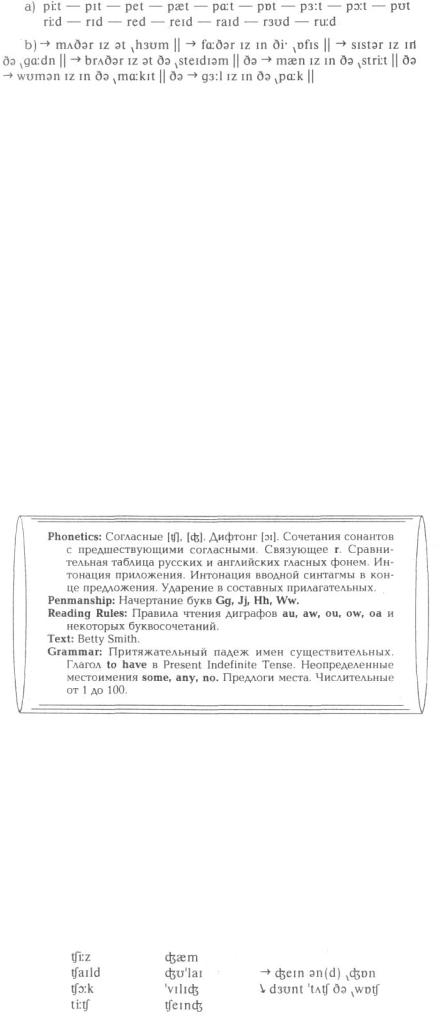
Laboratory work
I. a) Repeat the sentences after the tape. b) Make them interrogative and negative.
II. Repeat the general questions and give short answers to them.
III. Give the sentences in the plural.
IV. Supply short questions expressing surprise, doubt.
V. Repeat the alternative questions and change them into disjunctive ones. Observe the intonation. VI. Repeat the special questions and change them into general ones. Observe the intonation.
VII. Transcribe the words given on the tape.
VIII. These disjunctive questions are not true to fact. Correct them.
M o d e l 1 : Mr. Sandford is at home, isn't he? - Oh, no (I am afraid, you are mistaken), he is not in. M o d e l 2: Mr. Sandford is not a doctor, is he? - But he is.
Lesson Six
1. [ ], [ ] -
, . . , - [t] [d],
- [ ] [ ]. ,
. .
, .
[ ] [ ] . [ ]
.
[ ], , .
Phonetic Exercise 29
39
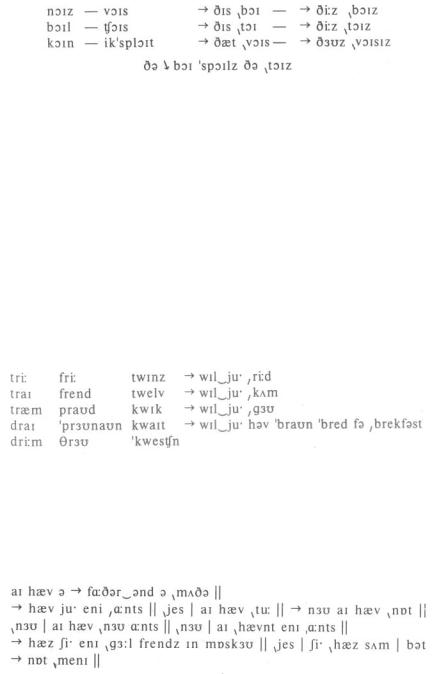
. , :
1.[ ] .
2.[ ].
3..
2. [ ] - . -
, . , [ ] [ ].
[ ]. [ ]
,
.
Phonetic Exercise 30
. , :
1.[ ].
2.[ ] [s].
3..
3. . [r, l, w, j] . : [bre k, gla d].
[r, 1, w, j] . : [tri:, ple , 'twent , tju:n].
[t, d]
[r]. : [tra , dra ].
[1 + j] [1]. : [/w l ju ].
Phonetic Exercise 31
4. r . , r, ,
, [r],
r» (linking r). , r .
Phonetic Exercise 32
. , to have,
.
40
